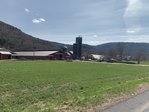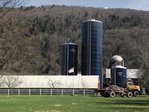

DOWNSVILLE - Turns out there is a reason to cry over spilled milk.
Each day, the Mattson family of Harmonie Farm in Downville rise to milk their herd of more than 200 head of cows at 5 a.m. and return later, at 5 p.m., to do the same. But for three days in a row, after their hard work, owner Michael Mattson said, the milk truck picks up the milk - the family pays for the truck to pick up the milk - rounds the corner of the barn and dumps their hard work - nearly 7,600 gallons - into a pit on their property.
“It’s upsetting,” said Mattson. “There is no home for the milk.”
Mattson said the it is usually transported to a creameries in New Jersey, which he assumes, have been shut down.
“We don’t know exactly why or what is going on,” he said. “Ask me in a couple of weeks and I will know better.”
Mattson said the family farm is a part of the Dairy Farmers of America (FDA). He is unsure as to the financial repercussions.
“We are a part of the DFA,” he said. “But, I am sure we will get charged some kind of marketing fee.”
The turn of the new year looked promising for dairy farmers as the price per hundredweight had climbed to more than $20. With dairy products flying off the shelves as a result of bulk buying, the industry seemed on the verge of thriving, although that $20 began to drop about $3 per hundredweight. The dumping of milk indicates a gloomy forecast for an already-struggling industry.
When asked if he is worried about the stability of his farm, Mattson said he is not worried in the short term, but - “yes” - he is worried about the long term repercussions.
But it’s not just the Coronavirus that concerns Mattson.
Even if it’s well intentioned, Mattson said government involvement and determinations may “screw up the supply and demand.”
“There is a lot of milk available out West,” he said. “Dean Foods going bankrupt has also been hurting farmers.”
Michael operates the farm with his brother Mark and son, Andrew. It takes a total of six - three that work part time and three full-time, to keep things running. The farm has been in operation since 1958.
“The rest of this year will be a recovery year,” said the 65-year-old.
Mattson has “no idea” if milk will continue to be dumped. He said part of the recovery year will be changing the narrative surrounding milk products.
“More attention needs to be brought to the nutritional value of milk and we need to get whole milk in schools,” he said of what can help farmers “long term.”
As for what’s next for the Mattson family and the dairy industry, there are a lot of unknowns.
“It’s the big question,” he said. “We have survived this long - we can survive this.”